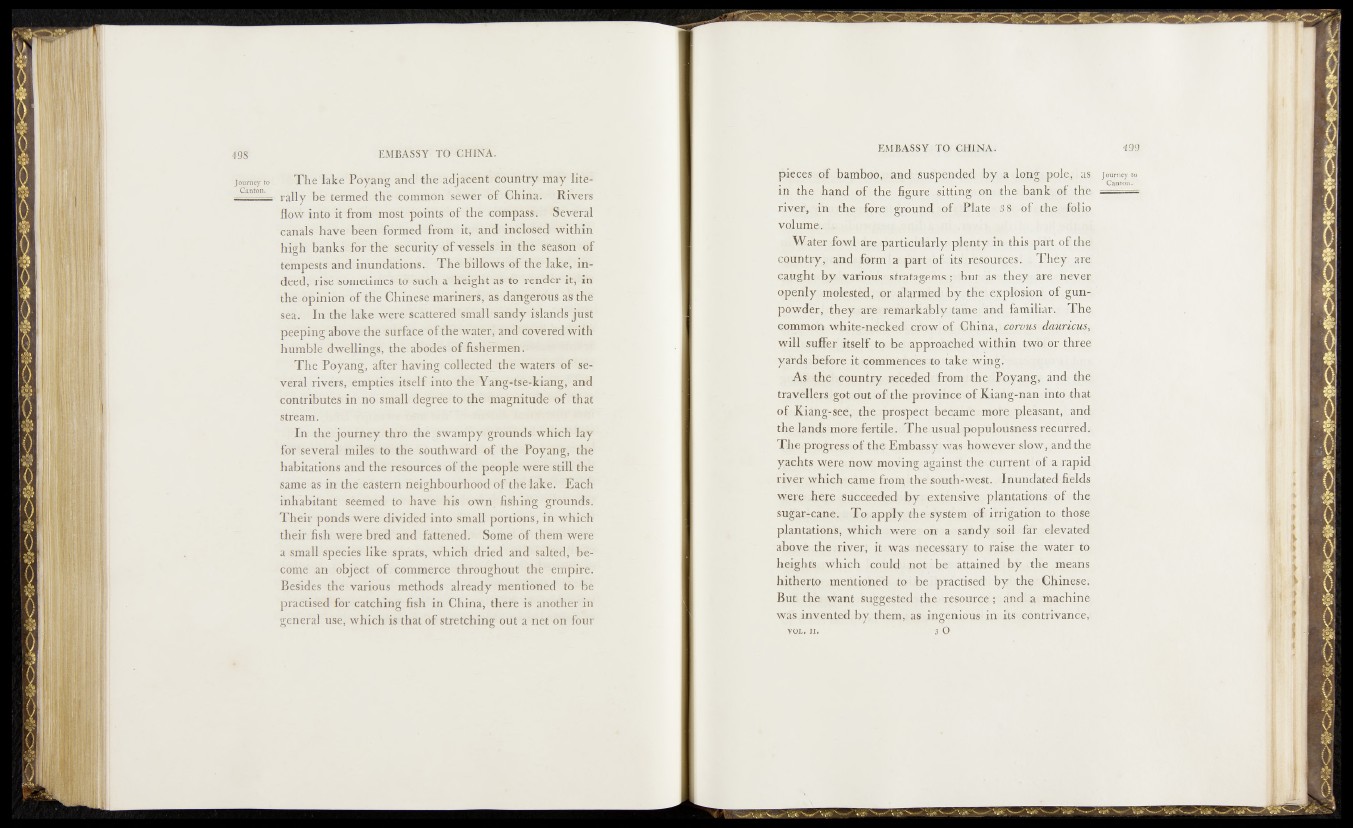
Journey to \ The lake Poyang and' the adjacent’Country niay 'lit&i
anton' raUy dae: termed the- 'common *sewir of China. Rive©
flow into it from most'points of 'the comp&sàWi'î'Se vera'1
canals haYe'been formed from it^ an d inclosed within
hSghi bahksfbr the security of vessels in théSeasóöïöf
tempests and inundations. "The* billows of thedake,'indeed;
Tfse sometimes tor sötüj af height ÿs tb render ïtftSn
the .opinion of the Chinesèmariners, as dangéïdus afe'tfe
sea. In the lake .were-scattered small saôdÿ^fefidsl#^
p ip in g above the ‘sürfafee ©f the wâterv and’covfered^vîfh'
humble dwellings, the abodes: of fishermen . •
The Poÿaiïg; after having collected^'theNratëfsa£fëP®e^
veral rivers, empties itself into the Yang-tse-kiang, and
contributes in no small degree* tb' the ’magnitudet-Of that
stream, y
In the journey thro the swampy«* grounds«whrfcMâ^
for several miles to the southward of the Pbyang1, the
habitations and the resources of the people Were still the5
same as in the eastern neighbourhood* of the-lake : fe t®
inhabitant seemed to have hisf own fishing'^roùnds.
Their ponds were divided into small portions, in which
their fish were bred and fattened. Some of them Wéfe
a small species like sprats, which dried and salt«!, become
an object of commerce throughout the empire.
Besides the various methods already menticfrïêd' tö be
practised for catching fish in China, there is another M
general use, which is that of stretching out a net on four
pikp^s^jfc/bamhoo ,t. an^su&fe(tei(4-?fw|'tjf»n^xpnle,')’ as
i&;'the - h an d , of 'the fio-iy^sitteiartst^ihe. bank 4hE>
river, in the folio
vqln?np.tm4^ii
Wate$ JowVaae^ipart^GMarLyipleniyj^fcthmdWtj, th^.
cQjintry,jiap4rffeoila&parhtbfii'n%^tMiiii®^l;ii Th|tVivar^.’
c^ugl^ibyAvaifrousvsfiat^rt tes «; pb u t. > «as yt h e^pai e*. nc.y.6{£
openly 'molesfied'^r^a%rmfedi;biy^fehte|^p.p)^^Bk<|f ,guind,
pdtwdga; thefy^^eftre m a rK a b a ^ r e j i a n d , i l p b %
common wh i te - n rlawf «af. aChilva.Mo^us^dtmmciiS'ji
willsuffer atself to hei»^pfokcjpfed^ithin feyv^Ipr .tfired
Wed’S ibefore it.iComm,eim^s;|8*@ ftafeepw
As< 4h,ehc,q]unfry ,^4^®dfdrom J rhef^Ro^^ ^ andrjhp»
travdleraigot- out ofithmptevihe^pf Kiah)g-,T*an'>into idhafe
oi Kian^^^iS&e^p^sspecDbe^&fe^nief^pMlMtfe^nd
the lands4-niorefertMe.!'Thpiusuakptopulousn:essa^e,urred'4
Th$.pE€jgre,ssjof the BmfeassviWas how<e^.ei®sj'0^,ian.d th e
yachts wnreuiow?:movingta^ainst Th>eNmirrent:, ©^M^apid
riyer,whichvcame from,jthe'so.ufiWwest., Inuirdated&lds
wtepenhepe ;sucched-^dn by^exten^bve, plantations,! ®!,%thh
sugar-cane. Tu,applv thoslystcra«'ofiitrigafcxohmjpdipsp^
plantations, which ijiye^e^o^a^rsafidy rsoil- Jarrelevatedl
a ^ y e <the invert it-s^s>m98Cpssaisyi to; rai&euthe? water te
heights, which ;ccadd;Jnephew at tained*«the jeans'
hitherto* mentioned: ,tceuheiipractised;'byrtheir Chinese.
But the, want suggested .the>|ee80urpgs$4 ^ * machiph
was invented, b.y, them,; as.. ingenious*« in,.ltsve©ntrivance,i